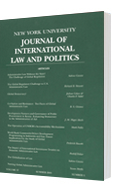The 11th Annual Herbert Rubin and Justice Rose Luttan Rubin International Law Symposium
Hosted by the New York University Journal of International Law and Politics
Co-Sponsored by the Institute for International Law and Justice and the Center on Law and Security
Program:
Opening Remarks: Clayton Gillette (Vice Dean NYU School of Law), Herbert Rubin (Founding Partner, Herzfeld & Rubin, PC), Gina Magel (Senior Symposium Editor)
Introductory Address:
His Excellency Dr. Zahir Tanin, Permanent Representative of Afghanistan to the United Nations
Panel I: Defining the Problem- The Characteristics and Consequences of State Weakness
Topics Covered:
- What are the various definitions for vulnerable statehood (weak, failing, failed, collapsing, unstable, ungoverned territories, etc.) and what do they mean?
- What factors contribute to state weakness?
- What role do tribalism, civil war, religious sects, ungoverned areas, and geography play?
- What are the consequences of state weakness?
- To what extent does state instability lead to terrorism, transnational crime, armed conflicts, and/or spill-over effects?
Panelists:
Moderator: Aziz Huq, The Brennan Center for Justice at NYU, and Adjunct Professor of Law at NYU School of Law
Patricia Taft, Senior Associate, The Fund for Peace
David Bosco, Contributing Writer, Foreign Policy Magazine; Visiting Scholar, American University School of International Service
P.L. de Silva, Lighthorse Partners
Panel II: Weak States in the International System
Topics Covered:
- How do weak, failing and unstable states fit within the international and legal political order?
- Do we have to rethink our conception of Westphalian world order?
- Is the Western concept of sovereignty and statehood inapplicable to weak and failing states? Does “forcing” certain states to apply Western standards lead to state weakness and failure?
- What is the standard of outside interference with weak or failed states?
- Does an enduring state have legal authority to judge a vulnerable state as a security threat and take unilateral action?
- Does an enduring state have legal authority to attack a non-state entity operating with impunity within a failed state?
- Does treating a weak state as a failed state beget state failure?
- What rules govern the operation of private actors in failed states?
- Are private military contractors supplanting standard use of force rules in failed states?
- What role do private military contractors play in counterterrorism operations in ungoverned areas?
- What contributions can international law make to the theory of statehood and new concerns arising from unilateral action and private military forces?
Panelists:
Moderator: Benedict Kingsbury, Professor of Law at NYU
Rosa Brooks, Los Angeles Times, Open Society, and Professor of Law at Georgetown University Law Center
Mohammad-Mahmoud Ould Mohamedou, Associate Director, Program on Humanitarian Policy and Conflict Research, Harvard School of Public Health
Doug Brooks, President, International Peace Operations Association
Brigadier General Kenneth Bergquist (retired), Special Operations Staff Director for US Central Command during Operation “Enduring Freedom” in Afghanistan
Part III: Fashioning a Solution- Policy Alternatives for Dealing with Weak States
Topics Covered:
- How should vulnerable states fit into the international system?
- Is democracy the answer?
- Elections are almost universally regarded as helpful in reducing conflict, but they may be ineffective or harmful to stability if they are rigged, conducted during active fighting, or attract a low turnout
- Perhaps the imposition of our traditional notions of democracy is not the appropriate response
- Is neo-imperialism a more appropriate response?
- What is the standard for breaking apart weak states into smaller state units?
- Does shared sovereignty or de facto trusteeships reduce conflict?
- How exactly should you go about repairing fragmentation?
- Should the conceptualization of state success be adjusted for certain states?
Panelists:
- Moderator: John Hirsch, former US Ambassador to the Republic of Sierra Leone, Adjunct Professor of International and Public Affairs, School of International and Public Affairs, Columbia University
- Bruce Jones, Co-Director and Senior Fellow at the NYU Center on International Cooperation
- Rick Barton, Co-Director, Post-Conflict Reconstruction Project and Senior Adviser, International Security Program, Center for Strategic and International Studies
- Kirsti Samuels, International Institute for Democracy and Electoral Assistance
- Tara McKelvey, Senior Editor, The American Prospect, and Research Fellow at the Center on Law and Security, NYU School of Law
Closing Remarks



